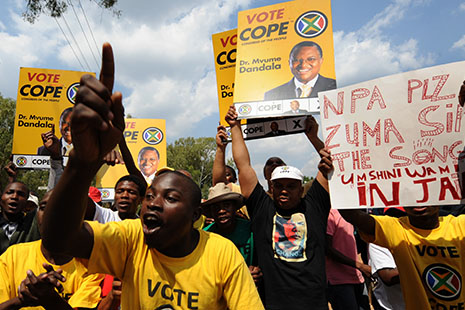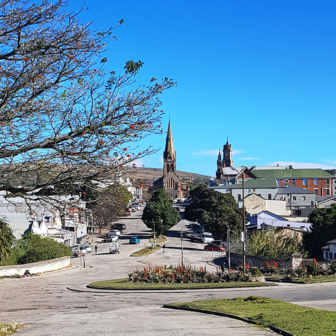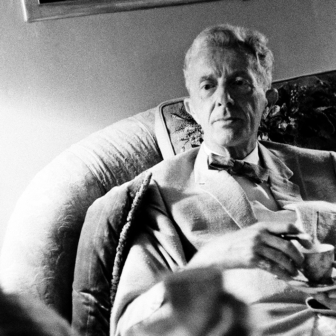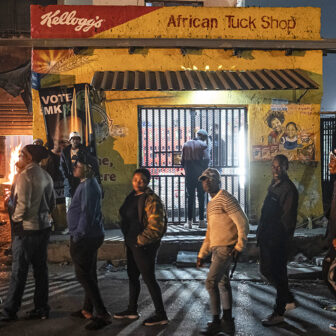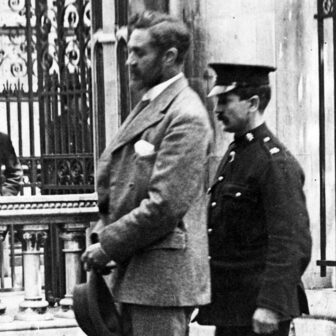SOUTH AFRICANS are just about inured to absurdity. After all, we lived through four-and-a-half decades of violent institutional Dada under apartheid. But that stark lunacy was easily navigated by comparison with the twilight world we find ourselves in on the eve of our fourth democratic election. These are times to try the most ardent of surrealists.
For many foreign observers, and perhaps for South Africans living in Australia, Canada, New Zealand and Britain, the overwhelming cause of bafflement is Jacob Zuma, the sixty-one year old president of the African National Congress who in just over a fortnight will assuredly take office as president.
How, they ask, with the irritating clarity of distance, did it come to pass that a man who took more than 700 separate payments from his “financial advisor” was able to sweep all legal and political obstacles before him? How, when the highest courts in the land have declared that those payments were intended to procure favours that were at odds with Zuma’s constitutional duties and were intended as bribes? How, when his acquittal on rape charges nonetheless revealed deeply disturbing attitudes to women and a cavalier indifference to the HIV/Aids epidemic that is cutting a swathe through South Africa? How could the near century-old liberation movement that produced Walter Sisulu and Nelson Mandela find itself so bereft of leadership that it could find no one else to whom it might bequeath its extraordinary legacy?
In that final question, perhaps, is the germ of an answer, but it is not one that will offer any consolation to those saddened by our all-too-abrupt maturation from child-star, outshining all the other new democracies of the 1990s, to bit player amid an array of pimply transitional societies.
These are questions that South Africans, buffeted daily by fresh revelations, don’t ask, as such, or rather don’t expect crisp answers to. Instead they form part of the droning anxiety that is the accompaniment to our national discourse at present – for supporters of Zuma and for his critics.
Ten years ago it was a heresy to say it – and indeed very few people had the knowledge, or the foresight, to even think it – but it is in the less glorious traditions of the ANC that the roots of our current confusion lie, and it is in the propagation of the party’s savage internal warfare across the basic institutions of state, from the courts to the security services, that the present threat is to be discerned. To make sense of that answer, it is necessary to traverse briefly, and with some violent simplifications, the recent history of how we got here.
On Monday this week Mokotedi Mpshe, the acting national director of public prosecutions – effectively South Africa’s attorney general – declared that all sixteen criminal charges against Jacob Zuma would be dropped. Mpshe made the move, he stressed, not because the evidence of fraud, corruption, money laundering and racketeering gathered by the prosecuting team is weak. On the contrary, it is voluminous, and solid. Zuma’s financial advisor, Schabir Shaik, has already been convicted on similar evidence and sentenced to fifteen years in jail for making the payments at the heart of the case. The two enjoyed a “mutually beneficial symbiosis,” the judge in that case ruled. In fact Zuma relied on Shaik to pony up for everything from school fees to traffic fines, and Shaik used Zuma over and over to lend political heft to his efforts to win state contracts, principally in a massive arms procurement deal and a waterfront development project.
Nor were the charges dropped, Mpshe said, because it would be impossible for Zuma to get a fair trial after seven years of investigation, a tortuous sequence of court battles and intense media attention. No, the legal drama that has consumed South Africa for almost decade has to be called off before its final act, he insisted, because evidence had been handed to the prosecution team showing that efforts had been made to manipulate the timing of the charges in a way that would favour Zuma’s rival for control of the ANC, then president Thabo Mbeki.
To put it as simply as possible, a cabal of politicians, crony capitalists and senior law enforcement officials loyal to Mbeki couldn’t leave well enough alone, and wrecked the case in their zeal to ensure that it inflicted maximum damage on the enemy.
UNFORTUNATELY this simple version won’t quite do. Zuma has long maintained that the charges against him were motivated by a political conspiracy to keep him out of office. He has personally avoided detailing that conspiracy, but his backers in the ANC and the intelligence services have been happy explain how Bulelani Ngcuka, who was chief prosecutor at the time the investigation began, was acting on behalf of Mbeki, and using the crack Scorpions unit as his instrument. Ngcuka’s wife, Phumzile Mlambo-Ngcuka, took over from Zuma as deputy president when, in the wake of Schabir Shaik’s 2005 conviction, Mbeki fired him. Other players in this scenario were important black capitalists like Mzi Khumalo and Saki Macozoma, who had benefitted from Mbeki’s policy of compelling white companies to offer shareholdings to people previously excluded from the commanding heights of the economy.
At their most lurid these claims took the form of a series of leaked “emails” purporting to be between the Ngcukas, the scorpions investigation team, journalists perceived as hostile to Zuma on my paper, the Mail & Guardian, and some of Mbeki’s key advisors. The emails were put into circulation in part thanks to the then head of the National Intelligence Agency, who had been conducting illegal surveillance of some of the players. They were clearly faked, stuffed with ludicrous errors and unlikely plans, but like all the best disinformation, there was plenty about them that was plausible, and the suspicion persisted that the outline of the plot they sketched was based on real eavesdropping.
That contention was strengthened on Monday when Mpshe released partial transcripts of spy agency tapes of the Scorpions boss, Leonard McCarthy, discussing the case with Ngcuka, and taking instructions from his former boss, years after the latter had quit for a lucrative career alongside Khumalo and others in “black economic empowerment.”
There is no suggestion that evidence was faked, but the tapes make it clear that McCarthy, Ngcuka and others in their circle, and perhaps Mbeki himself, tried to make sure that process of charging Zuma would be managed so as to inflict maximum damage on the presumptive ANC leader. In one discussion Ngcuka and McCarthy debate whether or not charges should be brought before the party’s elective conference at Polokwane, where Zuma and Mbeki would contest the leadership. After Mbeki’s loss McCarthy is recorded as saying, “[We must] wipe the blood off our faces … Saw the man on Friday, we are planning a comeback and then my friend we are going to clean up all around us.”
There is no disputing that the tapes are devastating, and their impact within the National Prosecuting Authority has been immense. Mpshe said he felt personally angered and betrayed – not least because he had said under oath that there had been no improper interference in the case. For some of the officials and investigators who managed the process on a day-to-day basis it was even worse. Willie Hofmeyr, who heads the unit that confiscated Shaik’s assets, is said by colleagues to be gutted by the revelations. It was he who orchestrated the push to drop charges once he had heard the recordings.
For investigators further down the ranks, who feel they were used by McCarthy and then hung out to dry when he left South Africa to become “institutional integrity” chief at the World Bank, the impact has been even worse. Careers have been destroyed and deeply felt principles about the campaign against institutional corruption shown up for hollow pretexts. “Lines were crossed,” says one person who was deeply involved in the case. “They fucked us all.”
That much is now obvious, and there was a kind of collective exhalation around South Africa as Mpshe brought down the curtain on the case. A broad swathe of public opinion, carefully shaped by a heavyweight ANC spin team and its outlets among the commentariat, holds that we need to wipe the slate clean and move on. We can’t take any more, this argument suggests, certainly not the trial of both Zuma and Mbeki, and not the cascade of revelations about our deeply compromised leadership that a full investigation into the corruption surrounding the 1999 deal to buy frigates, jets, submarines, and helicopters would bring. To put it more crudely, we need to chuck the rule of law overboard one more time, in order to save the ship of state.
Of course that’s a terrible idea. The questions that trail in the wake of Mpshe’s decision are not minor, or academic. How did the tapes get to Zuma’s legal team, and on what pretext were they made? Were the National Intelligence Agency and police intelligence services acting on behalf of Zuma, while McCarthy put his troops to work for Mbeki? If so, can we afford to leave political operatives in charge of either? If Zuma benefitted from corrupt payments in the arms deal, what about others – including the party – who took much more? And what about the corruptors in Britain, France, and Germany who gave our fledgling democracy the gift that keeps on giving? What is said on the rest of those tapes? And what precisely was Mbeki’s role?
Nothing could be more destabilising than a solution that leaves us without answers, living with both Mbeki’s tainted legacy and Zuma’s compromised rule.
That does not mean Zuma should be found guilty. It means that the evidence against him, and against the NPA, must be tested in court, the most painful details put in front of the entire country. We can handle it. After all, we defeated apartheid.
For now, as Sam Sole, the Mail & Guardian reporter who broke the story that Zuma was under investigation, puts it, “the victors are rewriting history.” “There never was a case against me,” Zuma has told jubilant supporters. For him, the media and opposition have abused the principle of “innocent until proven guilty,” and he will no doubt try to peg us back.
It is certainly not at all clear that the decision to drop charges was legally sound, although it was certainly politically convenient. The nature of the interference has not been clearly established in court, the evidence has not been tested, and the decision was effectively made in secret. Court challenges to Mpshe’s reasoning are already getting underway, starting with an application for review by the leader of the opposition Democratic Alliance, Helen Zille.
IN THE MEANTIME, there is an election for the rejuvenated Zuma to fight. There is no disputing that it will be the most interesting since 1994, principally because the battle between Mbeki and Zuma has turned what were hairline cracks in the dominant ANC into deep fissures. It may not yet be obvious in the returns, but we are on the cusp of a second transition, either to fuller democracy, or to a semi-permanent single party system.
The Congress of the People, split off from the ANC in the wake of Mbeki’s ouster, is very new, and compromised by the entanglement of its leadership in the battle against Zuma, but it offers for the first time the prospect of a plausible black opposition. For all the dubious business people clustered in the wings and the Mbekites on its electoral list, it matters that Cope find its way to a sustainable future for one reason: it has opened the political imagination of South Africans in an unprecedented way. Suddenly it is possible to conceive of opposition without the stigma of racism, of a political contest defined by all kinds of other factors from personality to policy, but not finally determined by monolithic racial identification.
Cope’s emergence may even make it easier for people to vote for Zille’s Democratic Alliance, which is still overwhelmingly white but trying to remake itself as a non-racial liberal alternative to the ANC. The party looks on track to win control of the Western Cape province, probably in coalition with Cope and smaller parties.
Even in the privacy of the voting booth, South Africans live out their political identities, rather making political choices. A great many black voters feel no affection for Zuma, or even for the ANC, but cannot yet conceive of voting otherwise. It is too early, Cope’s deputy president Mosioua Lekota concedes, to expect that to change dramatically, “but every year there are more and more people who weren’t born into that identification. We haven’t yet begun to understand the forces that we unleashed when we chose democracy.”
That kind of optimism is rare right now, and possibly misguided. We have a good few brutal years ahead of us, and we won’t be helped by the miserable economic weather that is fast closing in from abroad. But there are fragile harbingers of possibility on the wind. “Hope,” Emily Dickinson said, “is the thing with feathers,” and South Africa is a country full of strange, rare birds. •
